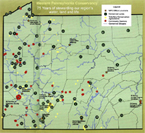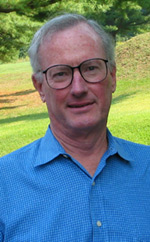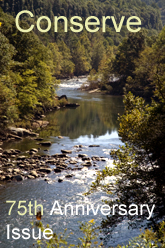|
Conserve |
|
| Conserve 75th Anniversary Commemorative Issue |
| 1930s - 40s |
| 1950s |
| 1960s |
| 1970s |
| 1980s |
| 1990s |
| 2000s |
| Fall 2007 Home |
| Past Issues |

Message from the Chairman
E. Michael Boyle
Chairman of the Board
75 Years of Protecting
Water, Land and Life
 I have had the great fortune to be a part of the Western Pennsylvania
Conservancy Board of Directors for 29 years, serving as its Chairman for
six of those years. I am honored to be associated with the many
dedicated individuals and grassroots organizations that have aligned
themselves with the Western Pennsylvania Conservancy over the past 75
years. It is our hope that the pages that follow will not only demonstrate
the breadth of achievements of this remarkable organization, but pay
tribute to those who came together at critical times in the name of protecting western Pennsylvania's natural world.
I have had the great fortune to be a part of the Western Pennsylvania
Conservancy Board of Directors for 29 years, serving as its Chairman for
six of those years. I am honored to be associated with the many
dedicated individuals and grassroots organizations that have aligned
themselves with the Western Pennsylvania Conservancy over the past 75
years. It is our hope that the pages that follow will not only demonstrate
the breadth of achievements of this remarkable organization, but pay
tribute to those who came together at critical times in the name of protecting western Pennsylvania's natural world.
In reflecting on our rich 75-year history, I would like to share with
you Dr. M. Graham Netting's "Conservation Commandments." Written in
1953, Dr. Netting, a WPC director for more than 50 years, eloquently and
forcefully expressed words which continue to guide this organization as we
carry on the vital tradition of protecting western Pennsylvania's water, land
and life.
Please join me in welcoming Tom Saunders as the Western Pennsylvania
Conservancy's seventh president and chief executive officer. In unanimously electing Tom as our new president, the members of the Board of
Directors demonstrated their confidence that Tom possesses the expertise
and leadership to carry forward the tradition, ideals and mission highlighted
in this publication.
Dr. M. Graham Netting’s Conservation Commandments
- Study the land so that each acre may be used wisely according to its
capabilities and treated according to its needs.
- Guard well the living soil, that it may continue to nurture man: Clothe it
lovingly with vegetation, Hold on to it tenaciously, Restore its fertility and
organic content, Improve it as a legacy for posterity.
- Reserve water, the lifeblood of civilization: Retard it on the surface, Trap it
in the soil, Guard its purity zealously.
- Cherish forests that they may: Conserve water, Shelter life, Provide for our
needs, Restore our tranquility.
- Respect all living things as having a role, however humble, in the balance
of nature.
- Provide living museums, samples of primeval America, to be managed by
nature alone, so that they may serve as reservoirs of wild species that may
be needed tomorrow, and provide control areas against which man’s efforts
at management may be measured.
- Learn to live in harmony with nature in an ecological symphony, a mutually beneficial dependency.

